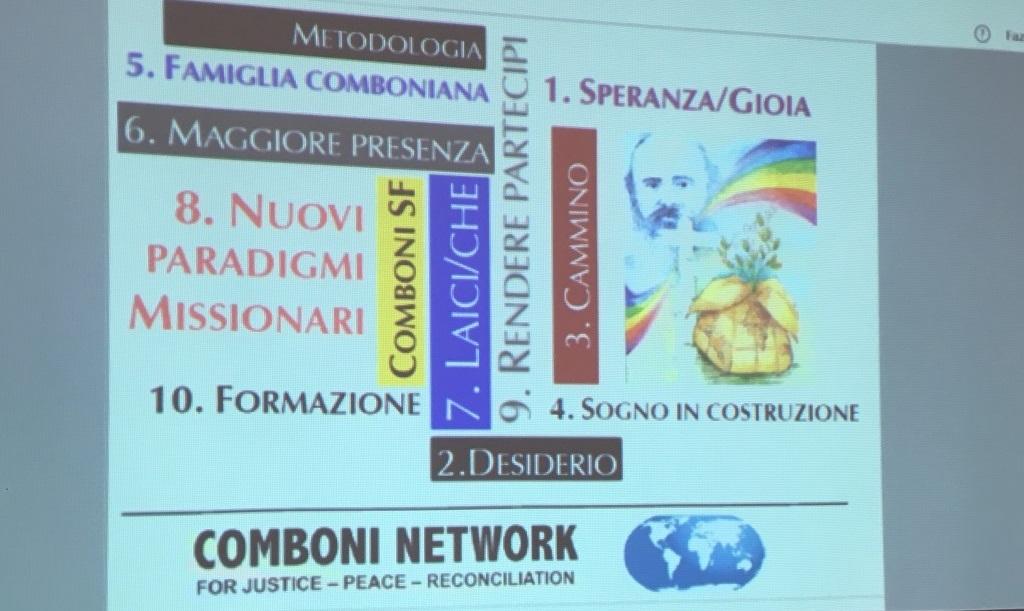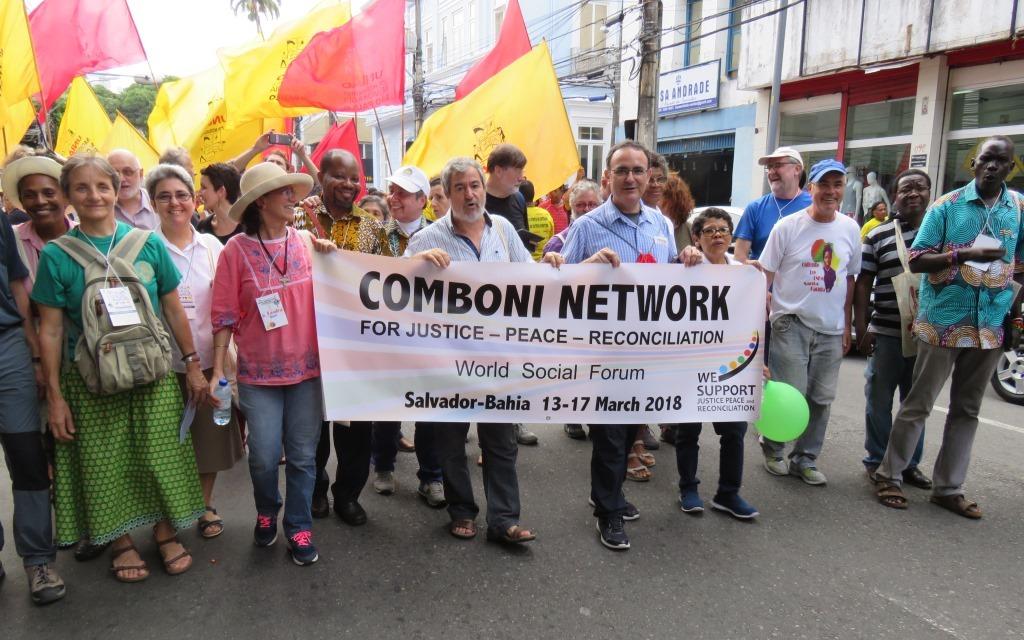INTEGRAL ECOLOGY IN A NUTSHELL
The 19th General Chapter adopted integral ecology as a fundamental axis of our mission that connects the pastoral, liturgical, formation, social, economic, political and environmental dimensions (AC ’22, 30). These are relatively new concepts and terminology, which might be off-putting to some. The difficulty lies in the fact that we are dealing with a complex reality, which cannot be reduced to simplifications and slogans. For this we refer to reading chapter IV of the encyclical Laudato si’, which gives an articulate restitution.
However, in order to facilitate an agile familiarisation with the reality of integral ecology, the General Secretariat of the Mission has produced 5 simple sheets to answer the most recurrent questions:
- Where does integral ecology come from?
- What is integral ecology?
- How does integral ecology work?
- What is ecological conversion?
- What does integral ecology have to do with mission?
1. Where does integral ecology come from?
In recent years there has been a growing awareness of the epochal crisis we are experiencing, characterised by
- devastating effects produced on the natural environment by climate change, resource exploitation and pollution, with the consequent loss of biodiversity;
- growing inequalities worldwide, social exclusion, impoverishment of millions of people;
- violence and conflicts around the world, resulting in a de facto ‘third world war in pieces’, with the nuclear risk increasingly looming with the war in Ukraine.
A sign of the times, linked to all these dynamics, is the dramatic – unprecedented – increase in the number of forced migrants, refugees and displaced persons in the world (281 million in 2020, of which 82.4 million refugees).
Pope Francis’ encyclical Laudato si’ helps us understand that.
We are faced not with two separate crises, one environmental and the other social, but rather with one complex crisis which is both social and environmental. Strategies for a solution demand an integrated approach to combating poverty, restoring dignity to the excluded, and at the same time protecting nature. (LS 139). Therefore today (…) we have to realize that a true ecological approach always becomes a social approach; it must integrate questions of justice in debates on the environment, so as to hear both the cry of the earth and the cry of the poor. (LS 49).
The global system, as it stands today, is unsustainable and is endangering life on the planet on an unprecedented scale. Science has shown that this crisis is due to human actions and that we have a very small window of opportunity left to prevent the worst. If we reach tipping points, climate change will intensify and be irreversible. We must act now to reverse trends, as we respond to the cry of the earth and the cry of the poor.
2. What is integral ecology?
The ecological crisis is the external manifestation of the ethical, cultural and spiritual crisis of modernity (LS 119). Integral ecology invites us to look at today’s situation in a different way, in the understanding that the socio-environmental crisis derives from a distorted anthropology, which, while reducing the human person to an isolated individual – understood mostly as homo oeconomicus -, considers nature exclusively as a resource to be exploited, thus leading us away from the vital relationship we should have with the Creator.
Integral ecology, in fact, is based on an integral view of life, starting with the conviction that everything is connected, that we are all interdependent, and that we depend on our Mother Earth. It also advocates the need for new forms of thought and practice in order to pursue “God’s dream for all of us who are his children” (Pope Francis).
Integral ecology suggests a renewed understanding of human relationships and with nature. This leads to a new economy, in which the production of wealth is directed towards the integral well-being of human beings and the improvement – not the destruction – of our common home. This also entails a renewed politics, conceived as one of the highest forms of charity (Paul VI), involving both all peoples and nature itself.
Integral ecology is a multifaceted approach to the ecological crisis, because it simultaneously addresses the economic, social and environmental crises we are experiencing, and considers it essential to seek integral solutions, that is, solutions that consider the interactions of natural systems with each other and with social systems, including the cultural and spiritual dimensions.
3. How does integral ecology work?
When we speak of the “environment”, what we really mean is a relationship existing between nature and the society which lives in it. Nature cannot be regarded as something separate from ourselves or as a mere setting in which we live. We are part of nature, included in it and thus in constant interaction with it. Recognizing the reasons why a given area is polluted requires a study of the workings of society, its economy, its behaviour patterns, and the ways it grasps reality. (LS 139)
We cannot fully understand environmental impacts without an analysis of the human and social contexts, and especially the economic system. Indeed, an economic system that needs unabated growth to sustain itself can only extract value from nature and human labour to accumulate wealth. Profit maximisation comes before the needs of people, human dignity and the balance of natural ecosystems. This is unsustainable, both environmentally, humanly and socially.
Every violation of solidarity and civic friendship harms the environment. Here we see the importance of so-called ‘social capital’ – that is, institutions, civil society, social groups and the common good – for ecology. On the contrary, a positive, fraternal, solidarity-based social life has a virtuous impact even on environments that are at first sight unbearable, weaving bonds of belonging and coexistence, and promoting authentic community experiences. In this way, any place can turn from being a hell on earth into the setting for a dignified life (LS 148).
A careless approach to the natural heritage inevitably translates into threats to other human heritages, such as the historical, artistic and cultural. And it goes without saying that the disappearance of a culture can be as serious as the disappearance of an animal or plant species, and perhaps more so, just as the imposition of a hegemonic lifestyle linked to a certain mode of production – the liberal-capitalist one – can be as harmful as the alteration of ecosystems.
Integral ecology also requires care for the cultural riches of humanity. In addressing environmental issues, it demands attention to local cultures, while engaging in honest dialogue with scientific knowledge. It is necessary to assume the perspective of the rights of peoples and cultures, constantly respecting the leading role of local social actors, the keepers of indigenous knowledge and of their own culture. Laudato si’ emphasises:
In this sense, it is essential to show special care for indigenous communities and their cultural traditions. They are not merely one minority among others, but should be the principal dialogue partners, especially when large projects affecting their land are proposed. For them, land is not a commodity but rather a gift from God and from their ancestors who rest there, a sacred space with which they need to interact if they are to maintain their identity and values. When they remain on their land, they themselves care for it best. Nevertheless, in various parts of the world, pressure is being put on them to abandon their homelands to make room for agricultural or mining projects which are undertaken without regard for the degradation of nature and culture. (LS 146)
4. What is ecological conversion?
Evangelisation, understood as the proclamation of the Kingdom of God and a call to conversion of heart, has much to say in relation to the existential and planetary situation of our time. The proclamation of the Risen Christ today cannot fail to connect with the need for spiritual reconnection with Creation and the Creator. The profound experience of being daughters and sons of God, loved, united in Christ’s love for the world, cannot but generate new relationships with Creation and within the human community.
Laudato si’ is clear in this regard:
Care for nature is part of a lifestyle which includes the capacity for living together and communion. Jesus reminded us that we have God as our common Father and that this makes us brothers and sisters. Fraternal love can only be gratuitous; it can never be a means of repaying others for what they have done or will do for us. That is why it is possible to love our enemies. This same gratuitousness inspires us to love and accept the wind, the sun and the clouds, even though we cannot control them. In this sense, we can speak of a “universal fraternity”. (LS 228)
Right relationships, that is, capable of generating life, will be those that first change the economic-financial paradigm that is so unsustainable and unjust as to lead Pope Francis to call it ‘an economy that kills’ (Evangelii gaudium, 53). To limit and stop climate change, pollution, the devastation of ecosystems and the loss of biodiversity, we need a different development and economic-financial model.
The current global economic system, based on unabated economic growth, is the structural cause of the world’s unsustainability. It is clear that indefinite economic growth is impossible in a world of finite resources, yet we continue to pursue unlimited growth. We are faced with the moral imperative – and the practical urgency – to question ourselves about many things: How do we produce? How do we consume? What can we say in our culture of waste? How can we broaden the horizon of our short-term visions? Is it right to continue to exploit the poor with total indifference? How do we judge the widening inequalities in the world? Does it make sense to continue to depend on harmful energy sources?
It is time to start believing that it is possible to create a ‘post-growth’ society, characterised by care and well living, radically different from today’s consumerist society, drugged by the accumulation of wealth.
Another important point emphasised by Pope Francis is that an ecological conversion generates civil and political love:
An integral ecology is also made up of simple daily gestures which break with the logic of violence, exploitation and selfishness. In the end, a world of exacerbated consumption is at the same time a world which mistreats life in all its forms.
Love, overflowing with small gestures of mutual care, is also civic and political, and it makes itself felt in every action that seeks to build a better world. Love for society and commitment to the common good are outstanding expressions of a charity which affects not only relationships between individuals but also “macro-relationships, social, economic and political ones” (…) In this framework, along with the importance of little everyday gestures, social love moves us to devise larger strategies to halt environmental degradation and to encourage a “culture of care” which permeates all of society. When we feel that God is calling us to intervene with others in these social dynamics, we should realize that this too is part of our spirituality, which is an exercise of charity and, as such, matures and sanctifies us. (LS 230-231)
Finally, an ecological conversion means overcoming the dynamics of domination and consumerist accumulation at the root of armed conflicts, embracing a peace-building choice capable of spreading a culture of peace. This begins in people’s hearts:
Inner peace is closely related to care for ecology and for the common good because, lived out authentically, it is reflected in a balanced lifestyle together with a capacity for wonder which takes us to a deeper understanding of life. Nature is filled with words of love, but how can we listen to them amid constant noise, interminable and nerve-wracking distractions, or the cult of appearances? Many people today sense a profound imbalance which drives them to frenetic activity and makes them feel busy, in a constant hurry which in turn leads them to ride rough-shod over everything around them. This too affects how they treat the environment. An integral ecology includes taking time to recover a serene harmony with creation, reflecting on our lifestyle and our ideals, and contemplating the Creator who lives among us and surrounds us, whose presence “must not be contrived but found, uncovered (EG 75). (LS 225)
5. What does integral ecology have to do with mission?
The 19th General Chapter expressed a missionary dream, outlining the vision of a horizon towards which the Comboni Missionaries are called to land (CA ’22, 28):
We dream of a missionary style more inserted into the reality of the peoples we accompany towards the Kingdom, capable of responding to the cry of the Earth and of the impoverished. A missionary style that is also characterized by simpler lifestyles and structures within intercultural communities where we witness fraternity, communion, social friendship and service to local Churches through specific pastoral care, ministerial collaboration and shared pathways.
From the point of view of the Comboni charism, this dream reflects making common cause with excluded and marginalised peoples and, in today’s awareness – in which we perceive that everything is connected – of the suffering Earth. Although in today’s world the geographical criterion of mission is no longer as decisive as in the past, the ad gentes dimension remains central to the mission of the Institute, taking on a more markedly anthropological emphasis. Here comes the invitation to an ever greater insertion in the life and reality of peoples, animated by a profound sense of compassion that manifests the heart of Jesus.
It is precisely the Comboni charism, therefore, that calls us to respond to the cry of peoples and of the Earth, along paths of ecological conversion. In particular, the Chapter has given a guideline (CA ’22, 30) for the next six years, which points us towards the path of Integral Ecology:
In response to the challenges of the epochal change we are experiencing, in the light of the Word of God, we take Integral Ecology as a fundamental axis of our mission that connects the pastoral, liturgical, formative, social, economic, political and environmental dimensions.
Two aspects of ecological conversion are emphasised here: the spiritual and the ministerial ones. First of all, ecological conversion is the fruit of an evangelical discernment, guided by the Word of God. We do not see it as a human project and, above all, reduced to the environmental dimension of reality. But it is the journey of faith, in response to the invitations of the Spirit, of those who listen to the Word of God and put it into practice.
Secondly, it is a pastoral conversion towards a ministerial approach that starts from the awareness that everything is connected. It invites us to overcome the fragmentation of our commitments and services, arriving at specific pastoral approaches, dedicated to particular human groups – especially according to continental priorities (AC ’22, 31) – that connect the pastoral, liturgical, formation, social, economic, political and environmental dimensions.
In his apostolic exhortation Ecclesia in Africa, John Paul II stated:
The purpose of evangelization is “transforming humanity from within and making it new”. In and through the Only Son the relations of people with God, one another and all creation will be renewed. For this reason the proclamation of the Gospel can contribute to the interior transformation of all people of good will whose hearts are open to the Holy Spirit’s action. (EiA 55)
This statement underscores that evangelisation is the fundamental dynamic, from our point of view, of ecological conversion, a response to the epochal challenges we experience today. A Trinitarian initiative, evangelisation also calls us to constant conversion and to proceed with the Church on a path of ecological conversion.
That is why the Chapter has committed to Join the Laudato Si’ initiative platform promoted by the Holy See’s Dicastery for Promoting Integral Human Development (Laudato Si’ Action Platform – LSAP) at various levels (community, Circumscription, Institute). (CA ‘22, 30.1)
[combonimission.net]




